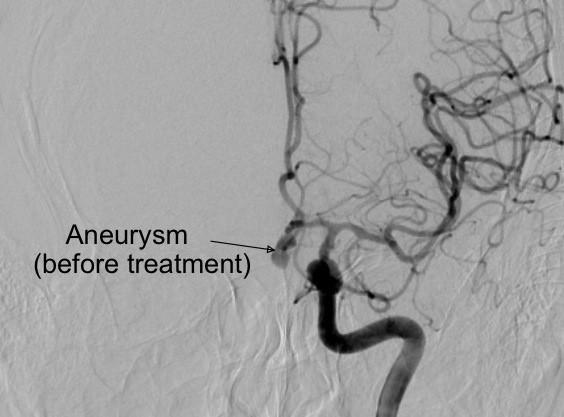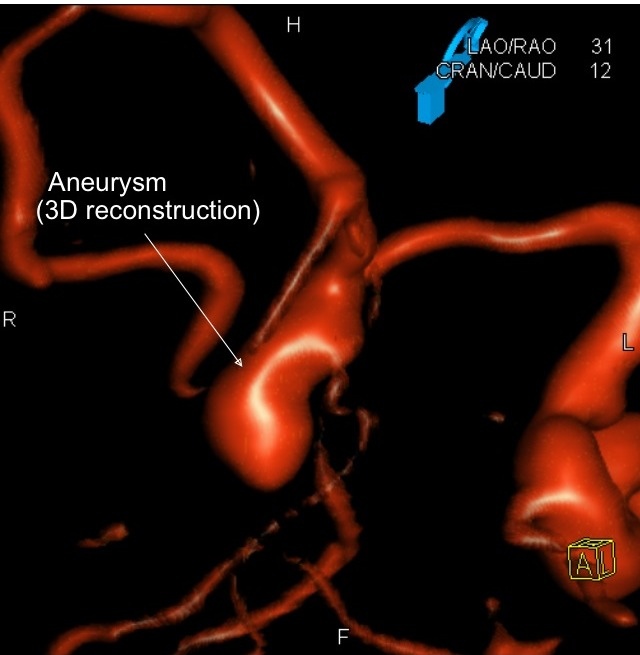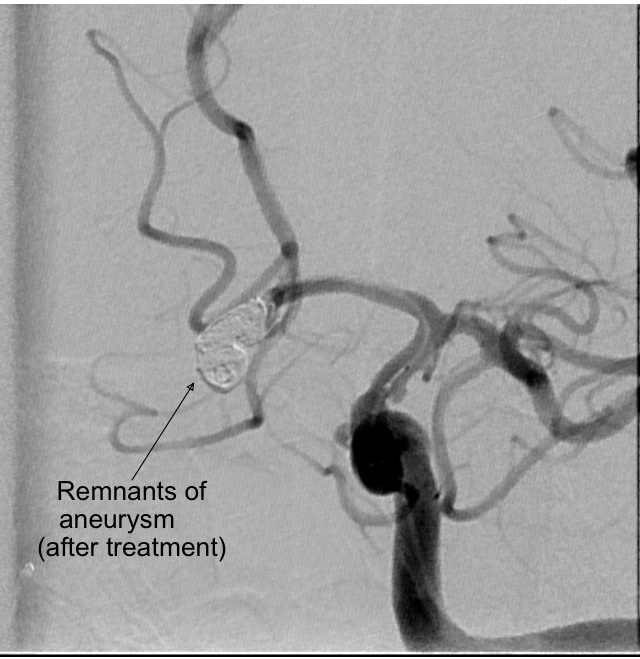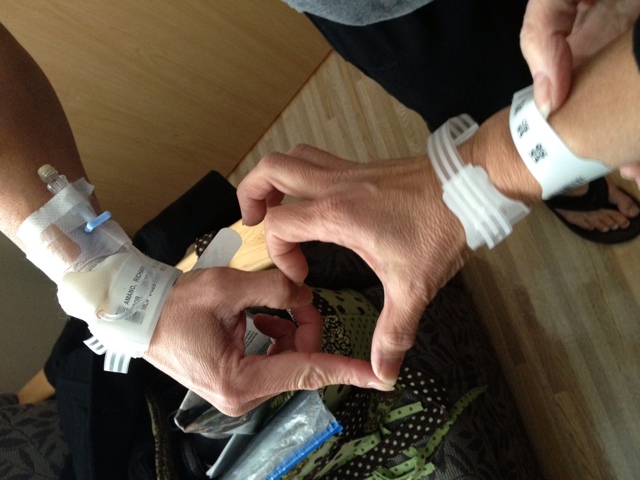Surviving a Ruptured Brain Aneurysm Against the Odds
by Ricky Amano, developer of iTreadmill
Hi, my name is Ricky Amano, and I am the developer of iTreadmill. On February 2, 2013, at age 50, I was working out at a gym with my wife, much like any other Saturday morning. I sat down on a bench to wait for her to complete her set on the leg press, when suddenly I felt something wasn't quite right with me. At first, my vision became slightly blurred and jittery. My wife, being a nurse, took one look at me and immediately had someone call 911. She laid me down on the ground so that I wouldn't fall over. Within seconds, I had a severe headache, felt nauseous, and both arms went numb with a strange swirly feeling from armpit to fingertips. The paramedics came soon after and took me on a stretcher because I was too shaky to stand.
The ambulance rushed me to the local ER. After a couple of hours of monitoring and a chest X-ray, they incorrectly concluded that I had fainted. It seemed like they were trying to force fit my diagnosis into either over exhaustion or cardiac issues. My wife suggested that they scan my head, because while the other symptoms cleared in time, I still had a massive headache, and she explained that I rarely ever get headaches. The doctor said it wasn't necessary, and when the chest xrays were negative, they decided it was a fainting spell and sent us home.
When we returned home, I still felt nauseous and vomited. My headache continued and I started wearing sunglasses all day, because my headache was very sensitive to light. I even turned the brightness way down on all of my electronic devices, because, well, I have to admit that I'm far too dependent on my iDevices! I tried to do some work from home, but it was difficult because looking at the screen bothered me, even with sunglasses on. I took the maximum amount allowed of Motrin regularly, which helped a little bit, but I found out later that it was not a good thing to take with what turned out to be a bleeding aneurysm. I also began doing basketball shootarounds in the backyard, thinking I needed to loosen things up, because my neck and back were a little stiff. After all, the doctors said that I was stiff because I over did myself at the gym. Little did I know that the aneurysm in my brain could bleed even more with an increase in blood pressure from physical activity. Fortunately, I couldn't move around very much anyway, due to my bad headache and stiffness in my neck and lower back - but I did try. Otherwise, I was pretty much confined to the couch all day. Somehow God kept me safe, but I did many things wrong due to lack of awareness of what was really wrong with me.
Two days later, we went to our primary doctor because I still had the bad headache 24 hours a day. He looked in my ears and sent me home with antibiotics, nose spray, and some headache drug (that didn't work), saying that my headache was due to plugged sinuses. He also had me get blood drawn for lab work. His diagnosis of sinusitis didn't really make much sense to us, considering all we had been thru up to that point, but his thinking was that the event at the gym was overexhaustion, and the severe headache was from plugged up sinuses. He was the doctor, and we couldn't order our own brain scan, so we had little choice but to let him go thru his course of care until he could figure it out, hoping that he would get there eventually. While we were concerned about it, we had no idea that there was a highly fatal situation brewing, like a ticking time bomb in my head, that only partially blew. A couple of days later, my wife called the doctor and asked him to please have my head scanned, because I still had a constant massive headache. He declined, saying that we should wait for the lab results to come back first, which would be a week later, and go from there.
Now losing faith in our doctor, she asked our friend, a Mayo neurologist, to come and check me out. He gladly came to our home that night and did a full one hour neurological assesment. Dr. Smith turned out to be not just a dear friend, but a life saver. He said that I passed all of the tests, but was very concerned about my severe headaches, which by this time had been going on for almost 5 days straight. He concluded that I had a thunderclap headache, which could be caused by bleeding in or around the brain. He ordered an MRA and found that I had an 11 mm brain aneurysm that ruptured, and that there was much bleeding in the front half of my brain. Apparently the incident at the gym 5 days before was the result of a hemorrhagic stroke caused by the rupture. This all came as a total shock, because prior to the incident at the gym, I had no symptoms or signs of what had been growing in my brain, probably years in the making (see the pictures below).

Angiogram of my aneurysm before surgery

He told us to leave the house immediately, and not even take time to turn off the lights or the TV. I know that my wife was stressed, but she remained calm and drove me to the Mayo Hospital ER as fast as she could. Within a couple of hours Dr. Chong did an angiogram (results shown in the pictures above) and 8 coils were put in my aneurysm. The platinum coils are packed into the aneurysm in order to prevent blood from filling the aneurysm and causing another leak. The medical team was excellent, the surgery went well, and I spent a few days in the ICU and then moved to the regular floor. We found out later that Dr. Chong is the only one at the Mayo here who does the coiling, and that he was about to leave on vacation as we arrived at the ER. Thank you Dr. Chong for staying hours longer to do my surgery, and thank you God for great timing!

Now on the regular floor, my headache gradually subsided, but I started to experience severe lower back pain, which I knew could not have been from bed sores. It was extremely painful, yet I had a difficult time explaining where it was coming from. The pain could not be relieved by rubbing, massaging, or changing positions. I was not able to sit up at more than a 30 degree angle. Fortunately my wife is a nurse, and after discussion with one of her nurse friends, suspected that some of the blood from my brain had drained down to my spine, irritating the nerves at the base of my spine. It made sense,that it was related to the aneurysm, because it was much like the neck and back stiffness that I felt when I was at home, only much, much worse. She asked them to MRI my back, and the doctor complied (I'm so glad that Mayo Hospital really listens to their patients!) and verified that her suspicions were correct. Apparently, this is not a typical condition, but does sometimes happen. I then spent a few more days in the hospital, for a total of 1 week, until my pain could be controlled without powerful IV drugs.

My first walk after surgery, looking cool with my shades and bright red socks!
(No, I didn't have iTreadmill running in my pocket, btw)
Only by God's grace, a loving wife who kept pushing for answers, my dear friend Dr. Smith, a great medical team at Mayo, and the prayers of friends & family did I survive and avoid severe disabilities. My wife had to push so hard for me the whole way, that she became depleted herself. She ended up in the ER for a couple of hours on my discharge day, which ironically was Valentine's Day! If she wanted to impress me with her love for me on Valentine's, she sure went all out!

While we were upset at the doctors (who shall not be named) who grossly misdiagnosed me, we read that brain aneurysm ruptures very commonly go misdiagnosed. We realize that misdiagnosis is largely due to a seemingly general lack of awareness by many doctors and most people of what the symptoms of a ruptured brain aneurysm look like, and the urgency of priority consideration. I think the problem is that it is rare enough that most of the time, the doctors do just fine not to even consider it. But when they do miss it, the consequences can be so devastating for the victim and their loved ones. While one in 50 people have an aneurysm, only one in 10,000 ever experience a rupture in their lifetime. When you are that one though, general population statistics don't really matter that much. For you, in your population of one, the probability has become 100%. Once your aneurysm ruptures, you have about an 80% chance of either dying or suffering permanent neurological disabilities. We feel that it is far more beneficial for future victims if we make the doctors aware of what happened than to consider any kind of legal action (especially since I survived, with hopefully no permanent deficits). I know that they were trying to help, but they need to be made more aware, because misdiagnosis can be fatal. We also think that it is equally important for people to be aware so that they can be better advocates for their loved ones or themselves.
As for me, the doctor says I'm doing excellent, but I am still dealing with heavy fatigue, some dizziness, and occasional headaches. But they remind me that with all that happened, I very likely could have been dead or severly disabled. Recovery, at first, seemed to be going very well, very fast. I no longer have the excruciating back pain, the headaches are less often, the sensations of someone grabbing my brain and feeling like a zombie most of the time are in the past, and that phase when I couldn't sit up to eat seems long gone from my memory. For a while, booming bass sounds and fluid motion on a TV show would cause dizziness and nausea. I also had extreme vertigo for a while, where the world visually spins around you, and all you can do is crouch down to the ground and close your eyes until it's over. But most of that is behind me now. I've hit the slow phase of recovery, the part where the lesser issues seem to linger. Fatigue, dizziness, occasional headaches. It's not so bad, except that these issues keep me from doing things that I need to be able to do at this point, such as being able to work for 8 hours a day in a job that heavily relies on my brain being turned on.
I do have another little aneurysm that we will need to continue monitoring and prevent from ballooning out like the last one. There are a few restrictions, basically to avoid excessive intracranial pressure. So no more having my head in an upside down position (no more handstands or tumbling around, which my wife says I'm too old for anyway), no hanging my head over or gardening (actually, I don't mind this one!), no over-exertion or bearing down.
Yet how can I complain when I know that I've actually been given a rare gift, the gift of more time with my family. To enjoy more days hanging out with my wife. More days to love and help my kids through life. I believe there is a heaven. I believe in a loving God who is waiting for me there because of what He did for me, and that it will be an eternity of joy and peace beyond what I have ever experienced. And I also believe that I was literally inches away from it. Through this experience of having been so close, I am excited to go there one day, and, some may not understand, to be totally honest, part of me was disappointed when it didn't happen. But I have also seen families devastated by the sudden loss of a loved one, and it is something that I would not want to put my family through. For that reason, I am indeed thankful and count it a great blessing for each new day that I have with them. Whenever I am able to help my kids out thru life, or let them know that I love them, or even just give a hug, I now consciously make a mental note that it was worth hanging around here for another day.
While I am so very thankful for the gift that I have so undeservedly been given, it does grieve me to think that so many others are being misdiagnosed with devastating results. Perhaps simple awareness could have prevented some of the deaths and permanent disabilities. If awareness could even have a small part in saving one life or preventing serious brain damage, it would all be worth it. I've been around long enough to know that one life has a major effect on so many people who love and care for that person. I can't help but think that at least some of my "bonus" time here on earth should be spent helping in some small way to prevent some of the tragedies that could occur as a result of misdiagnosis and delayed diagnosis by helping to spread awareness.
That being said, if you or anyone you know has any or all of the symptoms like I mentioned in my incredibly long story above (sorry!!), especially the thunderclap headache, please have it checked out! The Brain Aneurysm Foundation makes the following recommendation:
Seek Medical Attention Immediately If You Are Experiencing Some Or All Of These Symptoms:
Sudden severe headache, the worst headache of your life
Loss of consciousness
Nausea/Vomiting
Stiff Neck
Sudden blurred or double vision
Sudden pain above/behind the eye or difficulty seeing
Sudden change in mental status/awareness
Sudden trouble walking or dizziness
Sudden weakness and numbness
Sensitivity to light (photophobia)
Seizure
Drooping eyelid
The above list are common symptoms of a ruptured brain aneurysm, and I experienced 8 of the 11 symptoms listed above on the first day. If we were aware of this list when it happened, or if the initial doctors had been aware of this, we would have had it taken care of right away instead of 5 days later. Fortunately for me, God allowed me to hang on for 5 days until the good doctors at the Mayo Hospital could take care of me. But in most cases, 5 days late would equate to a terrible tragedy. Therefore, timing is urgent and it is best to be aware of it before it happens so that you can recognize it right away. Certainly, many of the symptoms above could be the result of other issues, but the point is to be aware and make sure that a ruptured brain aneurysm is considered along with the other possibilities. The Brain Aneurysm Foundation has been a valuable resource for me and for many others, and if you need more information, they have a wealth of information on their website at www.bafound.org
Thank you for taking the time to hear my story. I hope that it will help you to be more aware, for your sake and for others around you. Yes, brain aneurysm ruptures are somewhat rare, but when it happens, it is usually devastating. Please feel free to email me if you have any questions regarding my story, or if there's anything that I can do to help. Note, however, that I am not a doctor or a medical professional by any stretch, and so of course cannot provide any kind of medical counsel. I can only share from my experience and would love to listen to yours, and hopefully provide some encouraging words and understanding along the way.
-- ricky amano, developer of iTreadmill (ricky@itreadmill.net)
